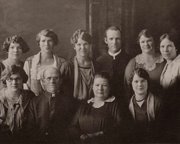The top U.S. commander in Iraq, Gen. Ray Odierno, identified tensions between the relatively affluent, peaceful Kurdish North and Iraq's al-Maliki government as the "No. 1 driver of instability", according to an Associated Press report by Anne Gearan published today, July 29, 2009 as seen at news.yahoo.com.
Gearan reports that "concern is growing that North-South tensions over land and resources could become a shooting war once U.S. forces leave." Her article quotes Defense Secretary Robert Gates as saying both sides had spent "too much in blood and treasure" since the 2003 U.S. invasion to risk losing it now.
North-South. Treasure. Interesting choice of words, since Jeremiah's prophecy says a "horde of great nations from the land of the north" will bring a sword "against (the Chaldeans') treasures, and they will be plundered."
The report says that most U.S. combat forces -- more than 100,000 troops -- will "remain in the country until after Iraqi national elections in January."
But according to Jeremiah's prophecy, the occupiers will abandon Babylon out of frustration, as a consequence of the cities burning and reconstruction failing -- "'I shall set fire to (the) cities... so the peoples will toil for nothing'... 'We applied healing to Babylon, but she was not healed; forsake her and let us each go to his own country.'"
Gearan reports that the "Kurds have been locked in a dispute with Baghdad over control of oil resources and a fault line of contested territory in northern Iraq, particularly the flash-point city of Kirkuk" and that "U.S. officials have warned that Arab-Kurdish tensions could erupt into a new front in the Iraq conflict".
And so after the burning of the cities and the abandonment by the occupation forces, as prophesied by Jeremiah, the Kurds will "draw up their battle lines against (Babylon), from there she will be taken captive, and Chaldea will become plunder; all who plunder her will have enough."
Invasion. Capture. Execution. Burning. Abandonment. Civil war. Plundering. Flood. Drought. A complete desolation, as seen by Jeremiah 2,600 years ago, coming true in our time. Three down, burning and abandonment up next. And after that, the Arab-Kurdish conflict, north against south. It is so decreed.
Labels: Judgment 6 - Civil War



